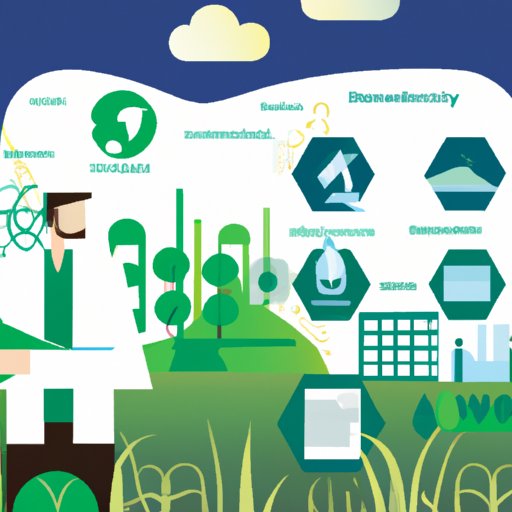Introduction
A masters in environmental science is a great way to gain an in-depth understanding of the natural world and how it is affected by human activity. It can open up a wide range of career opportunities, from working in the public policy arena to researching environmental problems and solutions to applying environmental science principles to business practices. This article will explore what you can do with a masters in environmental science and the various career paths that this degree can lead to.

Exploring Career Opportunities with a Masters in Environmental Science
With a masters in environmental science, you can pursue a number of different career paths. These include working in the public policy arena, applying environmental science principles to business practices, researching environmental problems and solutions, and teaching at the college level.
Working in the Public Policy Arena
Environmental policy is a key component of any government’s agenda, and those with a masters in environmental science are well-positioned to work in this field. Working in the public policy arena involves understanding the interplay between government and business, developing strategies for regulation and compliance, and using advocacy skills to support positive change. It also requires a deep knowledge of the nature of environmental problems as well as the ability to analyze different policy options and identify the benefits and challenges of different strategies.

Applying Environmental Science Principles to Business Practices
In today’s world, businesses need to be aware of their impact on the environment and make efforts to reduce their negative impacts. Those with a masters in environmental science can help businesses understand their environmental footprint and develop sustainable practices. This involves establishing environmental goals and standards, understanding the impact of business on environment, and developing strategies to reduce or offset environmental damage.
Researching Environmental Problems and Solutions
As environmental issues become increasingly complex, there is a growing need for researchers who can assess the extent of the problem, identify potential solutions, and evaluate the effectiveness of those solutions. Those with a masters in environmental science are well-positioned to take on this role, as they have the knowledge and experience to conduct rigorous research and develop evidence-based recommendations.

Teaching at the College Level
With a masters in environmental science, you may also choose to pursue a career in academia. Teaching at the college level involves developing curricula for environmental science courses, explaining complex concepts in an engaging way, and connecting theory to practice. It also requires strong communication and interpersonal skills, as well as a deep understanding of the subject matter.
Conclusion
A masters in environmental science can open up a wide range of career opportunities, from working in the public policy arena to researching environmental problems and solutions to applying environmental science principles to business practices. No matter which path you choose, your knowledge and experience can help to protect and improve the environment and create a better future for all.
(Note: Is this article not meeting your expectations? Do you have knowledge or insights to share? Unlock new opportunities and expand your reach by joining our authors team. Click Registration to join us and share your expertise with our readers.)
